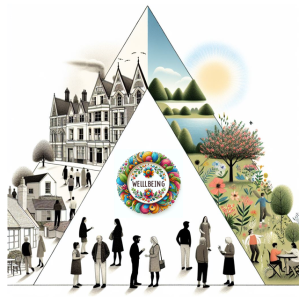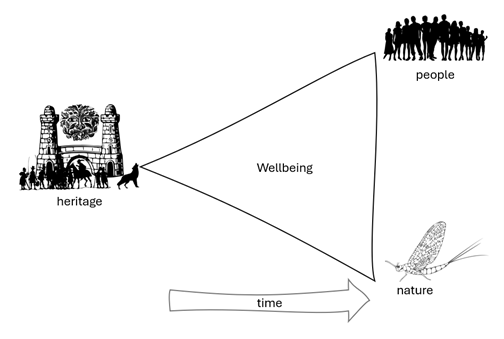Humans possess an innate desire for connectedness, a fundamental aspect of health and wellness that traditionally emphasises social bonds. Having started to think about nature connection across time we’ve been exploring the concept of ‘heritage connection’. Our latest research paper introduces heritage connectedness – a psychological construct with cognitive, emotional, and behavioural dimensions. This subjective sense of relationship with heritage is distinct yet complementary form of connectedness, enriching the interplay between people, nature, and place across time. The research sought to understand what heritage connection is and how well it explains wellbeing and pro-environmental behaviours. It has been published in the journal, The Historic Environment: Policy & Practice.

Heritage connectedness is proposed to contribute to both personal wellbeing and planetary health, aligning with frameworks like “One Health” which recognise human wellbeing as intertwined with a healthy natural world. Heritage connectedness extends beyond mere exposure to historic sites or objects, suggesting that a deeper, enduring relationship with heritage may independently foster wellbeing and environmental stewardship.
While previous studies have linked engagement with heritage—such as visiting historic spaces or participating in conservation activities—to psychological benefits like stronger identity and belonging, the subjective sense of connection to heritage has been underexplored. Drawing parallels with nature connectedness, where a personal relationship with nature predicts wellbeing more strongly than proximity alone, the paper suggests that heritage connectedness could similarly amplify the benefits of heritage engagement.
The research sought to understand what heritage connection is and whether it explains wellbeing and pro-environmental behaviours. We explored this, firstly through focus groups and then a survey of 1,823 adults. The study adapts an existing nature connectedness scale, the Inclusion of Nature in Self (INS), to measure heritage connectedness, focusing on heritage within a five-minute walk of participants’ homes in this study. The survey also included measures of social and nature connectedness, mental wellbeing (e.g., Warwick-Edinburgh Mental Well-being Scale), and environmental behaviours (e.g., Pro-nature Conservation Behaviour Scale). Socio-demographic factors such as age, sex, and employment status were included as benchmarks.
What is People’s understanding of Heritage Connectedness?
Participants in the focus groups described heritage connectedness as a multifaceted bond involving cognitive (knowledge and understanding), emotional (affect and feeling), and behavioural (engagement and action) dimensions. Tangible aspects like historic buildings and intangible elements like cultural traditions were both seen as integral to this connection.
Is Heritage Connectedness associated with Mental Wellbeing?
Survey findings revealed that people can meaningfully rate their heritage connectedness and that this sense of connection is distinct from social and nature connectedness. We found that heritage connectedness significantly predicted various wellbeing outcomes—life satisfaction, happiness, personal growth, and reduced depression and anxiety—often outperforming traditional benchmarks like marital status or social grade. It explained a very similar level of in mental wellbeing than social or nature connectedness, suggesting its potential inclusion in holistic health models.
Is Heritage Connectedness associated with Environmentalism?
Regarding environmentalism, heritage connectedness was linked to pro-nature conservation behaviours and a willingness to sacrifice for the environment, though its influence was weaker than that of nature connectedness.

The Importance of Connectedness to People, Place and Nature.
The research suggests that ‘heritage connectedness’ is a similar sort of construct to nature and social connectedness, offering a sense of connectedness that brings wellbeing and behavioural benefits. If people relate to heritage in ways that parallel relations with nature and people, it is possible that it is the relationship itself that matters for wellbeing and behaviour rather than heritage places, objects and activities. The findings also support the importance of relational worldviews that emphasise interconnectedness.
The figure below attempts to capture these relationships, highlighting what might be termed a ‘connectedness space’ between people and nature and their shared past. The figure highlights the need to facilitate connections between people and nature, plus people and heritage, for wellbeing and a sustainable future. Connections, be they social, natural or to heritage, need to be present and available; it helps for them to be local. Without local social connections people can become lonely and having nature nearby can boost wellbeing and physical health. Like the ecology of the Earth, everything is related and as conscious, storytelling, social beings that includes heritage. Broadly connectedness is essential for life and the health and wellbeing of that life.

The Connectedness Space: People, nature and place across time for wellbeing.
The results underscore heritage connectedness as a psychological construct with cognitive, emotional, and behavioural dimensions, akin to other forms of connectedness. It offers a sense of anchoring and belonging that enhances wellbeing, The paper proposes that fostering heritage connectedness—through increased exposure or tailored interventions—could improve mental health, mirroring successful nature-based approaches. Its environmental links further suggest a role in sustainability strategies, where appreciation of heritage might encourage stewardship of both cultural and natural resources.
Of course, as with the relatively recent construct of nature connectedness, there is a need for further research to understand heritage connectedness. Future research could refine definitions and metrics, develop interventions, and explore causal pathways, drawing on the trajectory of nature connectedness studies.
In conclusion, heritage connectedness emerges as a distinct yet complementary form of connectedness, enriching the interplay between people, nature, and place across time. Its associations with wellbeing and environmentalism highlight its potential as a foundation for feeling good and functioning well, positioning it as a vital component of a connected, sustainable future.
Richardson, M., Butler, C. W., Alcock, I., Tindley, A., Sheffield, D., & White, P. C. L. (2025). Introducing Heritage Connectedness: Connections to People, Nature and Place Across Time are Associated with Wellbeing and Environmentalism. The Historic Environment: Policy & Practice, 1–21. https://doi.org/10.1080/17567505.2025.2482163